人教版初一上册英语第六单元unit 6词汇篇
七年级上册英语单词unit6

七年级上册英语单词unit61. 单词学习的重要性在学习英语这门语言的过程中,掌握单词是至关重要的。
单词是构成语言的基本要素,是表达意思的基本单位,对于英语学习者来说,掌握单词意味着能够更准确地表达自己的意思,更深入地理解英语文本,也更容易进行口语交流。
七年级上册英语单词unit 6的学习对于学生来说具有重要意义。
2. Unit 6单词列表以下是七年级上册英语单词unit 6的单词列表:1) 本人rport2) hospital3) supermarket4) bookstore5) restaurant6) post office7) hotel8) bank9) police station10) museum11) library12) stadium13) playground14) cinema15) zoo16) park17) subway station18) school19) street20) avenue3. 单词意义及用法对于每个单词,学生需要掌握其基本意思以及在实际生活中的应用。
本人rport指的是“机场”,而在日常生活中,我们会用到“I'm going to the 本人rport to pick up my friend.”这样的句子中。
在学习这些单词的过程中,学生需要通过课堂教学、课外练习等方式,深入理解单词的意义和用法。
4. 单词学习方法为了帮助学生更好地掌握unit 6的单词,教师可以采取多种学习方法。
可以通过图片、视瓶等多媒体资源展示单词对应的场景,帮助学生形象地理解单词的意义。
可以安排学生进行单词拼写、造句等练习,通过实际运用帮助学生巩固记忆。
还可以组织学生进行角色扮演、小组讨论等活动,让学生在真实的场景中使用单词,提高他们的语言表达能力。
5. 单词学习的挑战在unit 6单词学习过程中,学生可能会遇到一些挑战。
一些单词的发音和拼写可能比较困难,学生需要花费更多的时间和精力去掌握。
最新人教版七年级上Unit6全单元课件
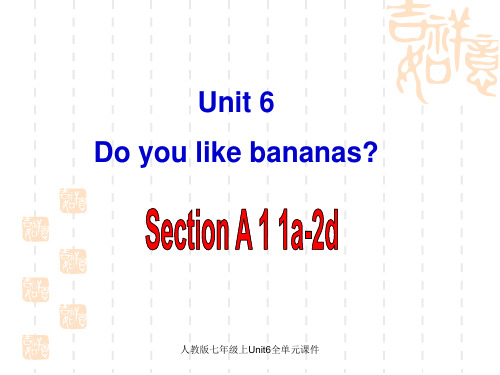
1 B: Yes, I do. A: Do you like oranges?
3 B: Yes, I do.
人教版七年级上Unit6全单元课件
1c Practice the conversations above with your partner. Then make your own conversations.
Bill: Sounds good. John likes hamburgers.
Jack: Oh, I don’t like salad. Bill: But John likes salad,
and it’s his birthday. Jack: Yes, you’re right.
What about the fruit? Tom: I think John likes strawberries and apples. Bill: OK. Let’s have strawberries and apples then.
人教版七年级上Unit6全单元课件
2d Role-play the conversation.
Jack: Hey, John’s birth day dinner is next week. Let’s think about the food.
Tom: Sure. How about burgers, vegetable salad, and some fruit?
strawberry --- strawberries
rice
tomato ---- tomatoes
人教版初一上册英语第六单元unit6词汇篇
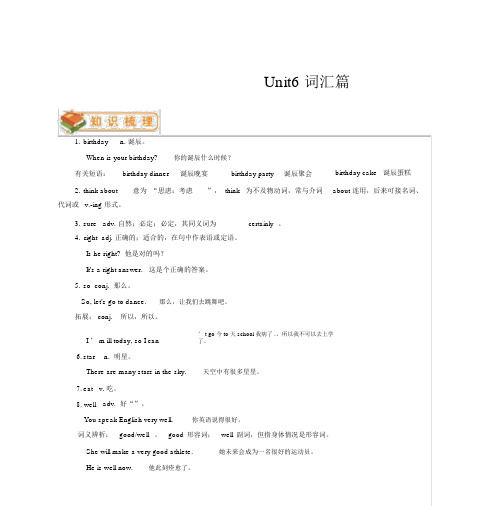
Unit6 词汇篇1.birthday n. 诞辰。
When is your birthday?你的诞辰什么时候?有关短语:birthday dinner诞辰晚宴birthday party诞辰聚会birthday cake 诞辰蛋糕2.think about意为“思虑;考虑”, think为不及物动词,常与介词about 连用,后来可接名词、代词或v.-ing 形式。
3.sure adv. 自然;必定;必定,其同义词为certainly。
4.right adj. 正确的;适合的,在句中作表语或定语。
Is he right? 他是对的吗?It's a right answer. 这是个正确的答案。
5.so conj. 那么。
So, let's go to dance.那么,让我们去跳舞吧。
拓展: conj.所以,所以。
I ’ m ill today, so I can ’ t go 今 to 天 school 我病了 .,所以我不可以去上学了。
6.star n. 明星。
There are many stars in the sky.天空中有很多星星。
7.eat v. 吃。
8.well adv. 好“”。
You speak English very well.你英语说得很好。
词义辨析:good/well。
good形容词;well副词,但指身体情况是形容词。
She will make a very good athlete.她未来会成为一名很好的运动员。
He is well now.他此刻痊愈了。
9.healthy adj. 健康的,可放在名词以前作定语,也可放在连系动词以后作表语。
Don't eat bad fruit, it's not healthy.别吃坏了的水果,不健康。
有关名词:health n. 健康。
Smoking is bad for your health.抽烟有害健康。
人教版七年级英语上册 Unit 6 知识归纳(含答案)
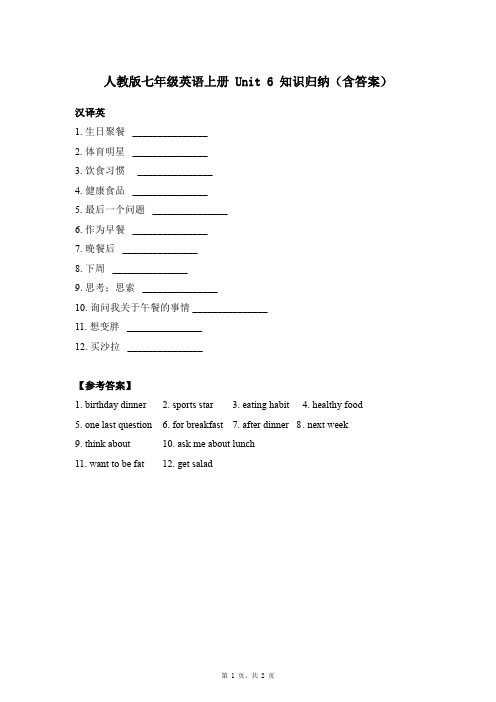
人教版七年级英语上册 Unit 6 知识归纳(含答案)汉译英1.生日聚餐_______________2.体育明星_______________3.饮食习惯_______________4.健康食品_______________5.最后一个问题_______________6.作为早餐_______________7.晚餐后_______________8.下周_______________9.思考;思索_______________10.询问我关于午餐的事情_______________11.想变胖_______________12.买沙拉_______________【参考答案】1. birthday dinner2. sports star3. eating habit4. healthy food5. one last question6. for breakfast7. after dinner8. next week9. think about10. ask me about lunch11. want to be fat12. get salad汉译英1. Cindy认为她妹妹喜欢冰激凌。
____________________________________ 2.那么咱们喝牛奶吧!____________________________________ 3. Jack喜欢什么蔬菜?____________________________________ 4.——咱们早饭吃什么?——水果沙拉怎么样?____________________________________ ____________________________________ 5.——Tom喜欢梨吗?——不,他不喜欢。
____________________________________ ____________________________________ 6.——你们午饭后吃草莓吗?——是的,我们吃。
人教版七年级上册英语知识点全第六单元unit6知识点
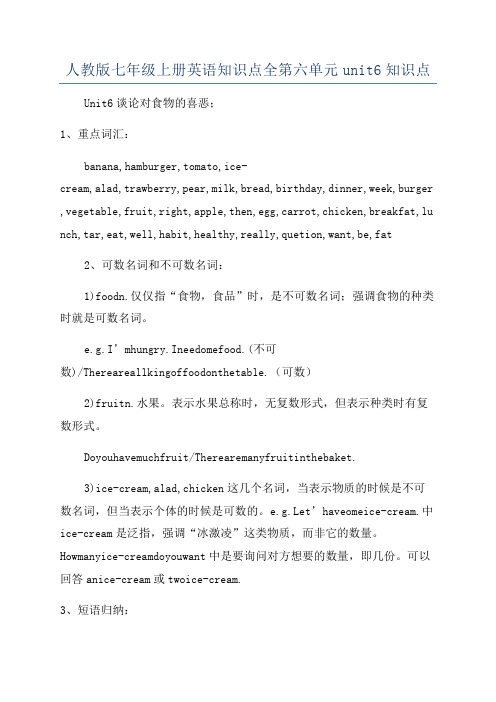
人教版七年级上册英语知识点全第六单元unit6知识点Unit6谈论对食物的喜恶;1、重点词汇:banana,hamburger,tomato,ice-cream,alad,trawberry,pear,milk,bread,birthday,dinner,week,burger ,vegetable,fruit,right,apple,then,egg,carrot,chicken,breakfat,lu nch,tar,eat,well,habit,healthy,really,quetion,want,be,fat2、可数名词和不可数名词:1)foodn.仅仅指“食物,食品”时,是不可数名词;强调食物的种类时就是可数名词。
e.g.I’mhungry.Ineedomefood.(不可数)/Thereareallkingoffoodonthetable.(可数)2)fruitn.水果。
表示水果总称时,无复数形式,但表示种类时有复数形式。
Doyouhavemuchfruit/Therearemanyfruitinthebaket.3)ice-cream,alad,chicken这几个名词,当表示物质的时候是不可数名词,但当表示个体的时候是可数的。
e.g.Let’haveomeice-cream.中ice-cream是泛指,强调“冰激凌”这类物质,而非它的数量。
Howmanyice-creamdoyouwant中是要询问对方想要的数量,即几份。
可以回答anice-cream或twoice-cream.3、短语归纳:John’birthdaydinner约翰的生日晚餐ne某tweek下周thinkabout思考,考虑howabout怎么样omefruit一些水果hibirthday他的生日porttar体育明星eatinghabit饮食习惯forbreakfat作为早餐fordinner作为晚餐onelatquetion最后一个问题healthyfood健康的食品3、tomato可数n.“西红柿”复数形式:tomatoe人教版七上2022知识点总结全类似的以o结尾的名词,需加–e构成复数形式的单词还有potato,hero但photo等词而是以加—构成复数形式的。
七年级英语上册第六单元单词表(新目标英语)
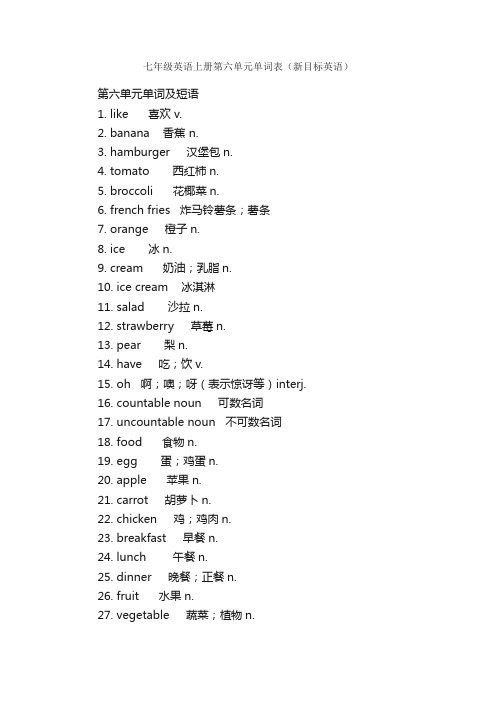
七年级英语上册第六单元单词表(新目标英语)第六单元单词及短语1. like 喜欢 v.2. banana 香蕉 n.3. hamburger 汉堡包n.4. tomato 西红柿n.5. broccoli 花椰菜n.6. french fries 炸马铃薯条;薯条7. orange 橙子n.8. ice 冰n.9. cream 奶油;乳脂n.10. ice cream 冰淇淋11. salad 沙拉n.12. strawberry 草莓n.13. pear 梨n.14. have 吃;饮v.15. oh 啊;噢;呀(表示惊讶等)interj.16. countable noun 可数名词17. uncountable noun 不可数名词18. food 食物n.19. egg 蛋;鸡蛋n.20. apple 苹果n.21. carrot 胡萝卜n.22. chicken 鸡;鸡肉n.23. breakfast 早餐n.24. lunch 午餐n.25. dinner 晚餐;正餐n.26. fruit 水果n.27. vegetable 蔬菜;植物n.28. runner 奔跑者n.29. eat 吃v.30. well 好;对;满意地adv.31. run 跑;奔跑v.32. star 星星;明星n.33. lot 许多;很多adv.34. lots of 大量;许多35. healthy 健康的;强健的adj.36. dessert (饭后的)甜食n.37. list 清单n.38. bill 比尔(男名)39. sandra 桑德拉(女名)40. clark 克拉克(姓)review of units 1---61. furniture 家具(总称)n.2. people 人;人民n.3. an (元音前)一个(只,把,台…)art.4. blank 空白n.5. conversation 交谈;谈话n.6. other 另外的人(物)pron.7. also 也;亦;而且adv.8. joe 乔(男名)。
七年级上册英语第六单元总结
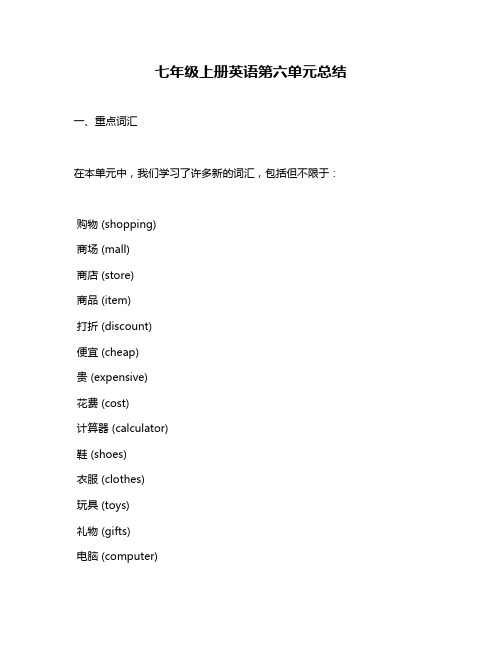
七年级上册英语第六单元总结一、重点词汇在本单元中,我们学习了许多新的词汇,包括但不限于:购物 (shopping)商场 (mall)商店 (store)商品 (item)打折 (discount)便宜 (cheap)贵 (expensive)花费 (cost)计算器 (calculator)鞋 (shoes)衣服 (clothes)玩具 (toys)礼物 (gifts)电脑 (computer)手机 (cellphone)电视 (TV)微波炉 (microwave)电饭煲 (rice cooker)二、主要句型在第六单元中,我们学习了以下主要的句型:1. "How much does it cost?" - "It costs $XX."2. "How much does it cost to buy a TV?" - "It costs $XX."3. "I need to buy a new pair of shoes." - "There are several stores in the mall that sell shoes."4. "This pair of shoes is too expensive." - "You might want to try another store."5. "I can't find the calculator I was looking for." - "You might want to try another store."6. "Do you have any discounts?" - "Yes, we do. XX% off for students."7. "Do you want to buy this pair of shoes?" - "Yes, I do." / "No, Idon't."8. "How much are these clothes?" - "They are $XX each."9. "I want to buy a gift for my friend." - "There are some nice toys in this store."10. "Do you want to come with me to the mall?" - "Yes, I do." / "No, I don't."三、语法重点在本单元中,我们重点学习了询问物品价格和进行购物对话的常用表达方式。
七年级上册英语第六单元总结归纳

七年级上册英语第六单元总结归纳以下是七年级上册英语第六单元的总结归纳:一、词汇1. like: 喜欢2. dislike: 不喜欢3. hamburgers: 汉堡包4. tomatoes: 西红柿5. strawberries: 草莓6. oranges: 橙子7. ice-cream: 冰淇淋8. salad: 沙拉9. French fries: 炸薯条10. bananas: 香蕉11. milk: 牛奶12. bread: 面包二、重点句型1. Do you like hamburgers? 你喜欢汉堡包吗?Yes, I do. / No, I don't. 是的,我喜欢。
/ 不,我不喜欢。
2. Does he/she like tomatoes? 他/她喜欢西红柿吗?Yes, he/she does. / No, he/she doesn't. 是的,他/她喜欢。
/不,他/她不喜欢。
3. What do you like for breakfast/lunch/dinner? 你早餐/午餐/晚餐喜欢吃什么?I like... for breakfast/lunch/dinner. 我早餐/午餐/晚餐喜欢吃……三、语法1. 一般现在时的用法:表示经常或习惯性的动作或状态。
2. 肯定句:主语+动词原形+其他3. 否定句:主语+don't/doesn't+动词原形+其他4. 一般疑问句:Do/Does+主语+动词原形+其他四、写作描述自己或他人的饮食喜好,包括喜欢和不喜欢的食物以及一日三餐的饮食习惯。
- 1、下载文档前请自行甄别文档内容的完整性,平台不提供额外的编辑、内容补充、找答案等附加服务。
- 2、"仅部分预览"的文档,不可在线预览部分如存在完整性等问题,可反馈申请退款(可完整预览的文档不适用该条件!)。
- 3、如文档侵犯您的权益,请联系客服反馈,我们会尽快为您处理(人工客服工作时间:9:00-18:30)。
Unit6 词汇篇1. birthday n. 生日。
When is your birthday? 你的生日什么时候?相关短语:birthday dinner 生日晚宴birthday party 生日聚会birthday cake 生日蛋糕2. think about意为“思考;考虑”,think为不及物动词,常与介词about连用,其后可接名词、代词或v.-ing形式。
3. sure adv. 当然;肯定;一定,其同义词为certainly。
4. right adj. 正确的;适当的,在句中作表语或定语。
Is he right? 他是对的吗?It's a right answer. 这是个正确的答案。
5. so conj. 那么。
So, let's go to dance. 那么,让我们去跳舞吧。
拓展:conj. 因此,所以。
I’m ill today, so I can’t go to school.今天我病了,所以我不能去上学了。
6. star n. 明星。
There are many stars in the sky. 天空中有许多星星。
7. eat v. 吃。
8. well adv. “好”。
You speak English very well. 你英语说得很好。
词义辨析:good/well。
good形容词;well副词,但指身体状况是形容词。
She will make a very good athlete. 她将来会成为一名很好的运动员。
He is well now. 他现在康复了。
9. healthy adj. 健康的,可放在名词之前作定语,也可放在连系动词之后作表语。
Don't eat bad fruit, it's not healthy. 别吃坏了的水果,不健康。
相关名词:health n. 健康。
Smoking is bad for your health. 吸烟有害健康。
10. really adv. 事实上;真正地。
I'm really sorry. 我很抱歉。
相关单词:adj. real 真的,真实的That is not her real name. 那不是她的真名。
11. want vt. 需要;想要。
(1)want sth. 想要某物I want a new schoolbag. 我想要一个新书包。
(2)want to do sth. 想要去做某事I want to play basketball after school. 我想放学后打篮球。
(3) want sb. to do sth. 想要某人做某事My mother wants me to get up early tomorrow. 我妈妈想让我明天早点起床。
12. Do you like bananas? 你喜欢香蕉吗?询问某人的喜好,通常用一般疑问句“Do/Does+主语+like+其他?”。
肯定回答用:Yes, 主语+do/does.,否定回答用:No, 主语+don’t/doesn’t.。
其中do/does为助动词。
—Do you like the sweater? —Yes, I do.—Does he like the pen? —No, he doesn’t.13. What do you like for breakfast? 你早餐喜欢吃什么?“What do/does+主语+like for+某餐?” 用于询问某人某餐喜欢吃什么。
介词for与一日三餐名称搭配使用时,表示三餐喜欢吃的食物。
I have bread for lunch. 我午餐喜欢吃面包。
单项选择1.Your birthday party is on Sunday . Let's about the drink and food.A. thinkB. wantC. haveD. eat2. Linda her friend, Gina, about her favorite food .A. helpsB. thinksC. asksD. wants3. Do you like French fries and fish dinner ?A. inB. ofC. aboutD. for4. Anna lost her ID card . She find it . She needs it at school .A. wantsB. hasC. want toD. wants to5. Tim is a student and he plays tennis .A. well; goodB. good; goodC. good; wellD. well; well6. ---May I use your dictionary for a while ?--- . It's on the desk.A. Yes, sureB. Take it easyC. You've got itD. Sorry, you can't7. ---May often has eggs and bread breakfast .A. withB. forC. on一、单词拼写(单句首字母填空)1. Eating more fruits and v is good for your health.2. My father sent me a new car as a present on my twenty-first b .3. If you want to stay h , you should often move your body.4. Do you w a big bed or a small one for your son?5. I get up at 6:00 in the morning and have b at 6:30.6. I usually look at the s in the sky(天空) at night.7. Most of the students have l at school.8. --- It's a good h to keep a diary every day.--- That's right. I believe it can help us improve our writing.9. Our classroom is r big and beautiful.10. David is good at singing. So he w to be a singer.二、翻译(根据中文提示完成句子)1. 我每天吃一个苹果。
I eat every day.2. 林书豪是一位运动明星。
Lin Shuhao is a .3. 我们应该多吃健康食品。
We should eat more .4. 我妹妹通常在学校吃午饭。
My sister usually at school.5. 这个女孩想成为一名歌手。
The girl a singer.三、排序题(连词成句)1. I, salad, think, is, food, healthy.2. like, hamburgers, I, them, eat, don't, but, I.3. for, have, I, you, one, question, last.4. apples, what, some, about, milk, and?5. lunch, have, where, you, like, do, to?一、单项选择1. Carrots are food. They are good for our .A. health; healthB. healthy; healthC. health; healthyD. healthy; healthy2. --- What do you like?--- Oranges and apples.A. colorsB. fruitC. vegetablesD. sports3. Little Jenny can draw . Her drawings are very .A. well; goodB. fine; goodC. OK; wellD. good; well4. --- your sister salad?--- Yes, she does.A. Does; likeB. Does; likesC. Do; likeD. Do; likes5. What you have dinner?A. are; inB. do; inC. do; aD. do; for6. Sue sports every day.A. don't playsB. doesn't playC. don't playD. doesn't plays7. My mother and I tomatoes.A. likeB. likesC. don't likesD. are like8. We usually have in the middle(中间) of the day.A. dinnerB. supperC. breakfastD. lunch9. you like ice cream?A. AreB. AmC. DoesD. Do10. --- Can you help me with my English, Jack?--- . Let's start (开始) now.A. GreatB. SoC. WellD. Sure二、完形填空Liz's birthday dinner is this evening. 1 friends Robert, Frank and Anna will(将要)2 to her dinner. What3 will they have? Let's look at the table. Some rice, vegetables, chicken and salad4 on the table.Liz is a vegetarian(素食主义者). She 5 eating meat is killing animals (杀害动物). So she 6 eat meat. But why is some chicken on her table? Look at the 7 carefully(仔细地). It's not real chicken. It's tofu chicken! It's 8 , right?Liz's parents are vegetarians, too. They think their 9 habits are healthy. And they are10 healthy. No one in their family is fat.Do you like to be a vegetarian?1. A. She B. Her C. He D. His2. A. come B. watch C. play D. want3. A. picture B. fruit C. game D. food4. A. am B. is C. are D. be5. A. thinks B. likes C. gets D. looks6. A. do B. does C. don't D. doesn't7. A. rice B. vegetables C. chicken D. salad8. A. easy B. difficult C. interesting D. boring9. A. eat B. have C. having D. eating10. A. real B. really C. great D. greatly一、单项选择1. I like bananas, but I like apples.A. doB. doesC. don'tD. doesn't2. My favorite is .A. fruit; breadB. vegetable; carrotsC. sport; eggsD. color; sofa3. Linda wants games with her friends.A. playB. playsC. to playD. playing4. One of them playing football.A. don't likeB. doesn't likeC. isn't likeD. aren't like5. --- I like oranges. ?--- I like apples.A. Are these orangesB. Do you like applesC. What about youD. What are these6. I have apple and my sister has rice every evening.A. an; aB. a; aC. a; /D. an; /7. Cindy, what do you like lunch?A. onB. inC. forD. with8. Look! Some ice-cream on the table.A. amB. isC. areD. be9. I don't like hamburgers, because .A. they are boringB. they aren't boringC. they are healthyD. they aren't healthy10. Mary, please get some for me.A. milkB. appleC. tomatoD. pear二、完形填空My name is Sandra. I have a brother. 1 name is Tom. We like different(不同的) sports. I like playing 2 . It is fun. I like tennis, too. 3 I don't like basketball. It is 4 . My brother 5 basketball. He has four basketballs. He 6 basketball every day. We like different 7 . I like eggs, apples and hamburgers 8 breakfast and dinner. For dessert, I like 9 . Tom likes oranges, chicken and carrots. We are 10 because(因为) we often play sports and eat good food.1. A. He B. She C. Her D. His2. A. volleyball B. basketball C. the piano D. the violin3. A. And B. With C. But D. Of4. A. fun B. difficult C. interesting D. fine5. A. likes B. don't like C. like D. doesn't like6. A. looks B. knows C. plays D. has7. A. food B. books C. colors D. classes8. A. in B. on C. for D. at9. A. hamburgers B. chicken C. broccoli D. ice cream10. A. boring B. healthy C. great D. relaxing三、阅读理解AWhat do you eat every day? Do you eat well? You need lots of fruit. You don't need lots of dessert(甜点). You need many vegetables, but you don't need many hamburgers. You need some chicken and eggs, but you don't need many French fries(炸薯条).Hi! I'm Mary. I like hamburgers, French fries, chicken and ice-cream. I eat lots of them. I don't like eggs, fruit or vegetables. I don't eat eggs, apples, bananas, carrots or tomatoes.Hi! I'm Nick. I like oranges, apples, bananas, carrots, tomatoes and salad. I eat lots of them. I like chicken and eggs, too. And I eat some of them. I don' t like ice-cream or French fries. I don't eat them. I'm healthy.Healthy food is good for us. Do you think so?1. Mary doesn't eat .A. French friesB. icecreamC. eggsD. chicken2. Nick doesn't like .A. chickenB. eggsC. bananasD. French fries3. Does Mary eat bananas every day?A. Yes, she does.B. No, she does.C. No, she doesn't.D. Yes, she eats.4. What vegetables does Nick like?A. Pears.B. Bananas.C. Oranges.D. Carrots.5. We need to eat .A. many hamburgersB. many French friesC. fruit and vegetablesD. lots of dessertBEvery country has its favorite food. Italians like to eat pizza(比萨). Indians like to eat hot food. Japanese like to eat fish. Often they don't cook it. The English's favorite food is fish and chips. They often get them in the shop and take them home or eat them in the park. The American's favorite food is fast food, but it is not good for health.6. like to eat pizza.A. ChineseB. AmericansC. EnglishD. Italians7. Japanese like to eat .A. pizzaB. hot foodC. fishD. fast food8. Li Yun is from China. She likes to eat .A. hot foodB. fast foodC. vegetablesD. pizza9. The people in often buy fish and chips.A. the USAB. EnglandC. ChinaD. Italy10. isn't healthy food.A. Fast foodB. Hot foodC. PizzaD. Rice and vegetables四、阅读与表达(问答式)People in different parts of the world eat different things. In South China people eat rice every day. Sometimes they eat it two or three times a day, for breakfast, lunch and supper. And people usually eat rice with fish, meat and vegetables.The Japanese eat rice, too. They also eat a lot of fish because they live near the sea. It's easy for them to get fish. Sometimes, they eat raw(生的) fish.In western countries such as Britain, Australia and the USA, the most important food is bread and potatoes. People there can cook potatoes in many different ways. In Britain the most popular food is fish and chips. Sometimes people cook this kind of food at home, but they usually buy it at the shop. They eat it at home, in their workplace, in the park or even on the road. People call it "take-away" food.根据短文内容,完成下列小题。
